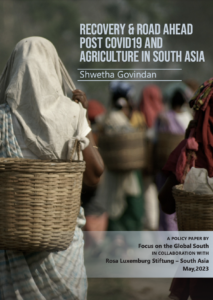19/05/2023
Under: Food Sovereignty and Agroecology, India, Publications, Trade and Investment
Author: Shwetha Govindan
This paper discusses the repercussions of the COVID-19 pandemic on food systems in South Asia to highlight the aftermath of the disruptions to supply chains, farming and agricultural markets. It examines the situation over two years into the pandemic with a focus on countries such as Pakistan, Sri Lanka, Bangladesh, Nepal and India. The ongoing challenges in the road to recovery such as loss of employment, climate change and inequality point to several pre-existing gaps in the system. As a region, South Asia has a diverse agrarian landscape but there is significant overlap among countries in challenges such as income and gender inequality; climate risk and vulnerability. Band-aid solutions to the food crisis during the pandemic are inadequate and policymakers should treat this moment as an opportunity to critically examine the role of international financial institutions, multinational corporations and trading regimes in the global food systems governance. This calls for a concerted effort to improve regional cooperation. A resilient future for the region, depends on the equitable management of resources, knowledge sharing and a strong grassroots led movement across neighbouring countries.
Published by: Focus on the Global South with support from the Rosa Luxemburg Stiftung – South Asia office.






